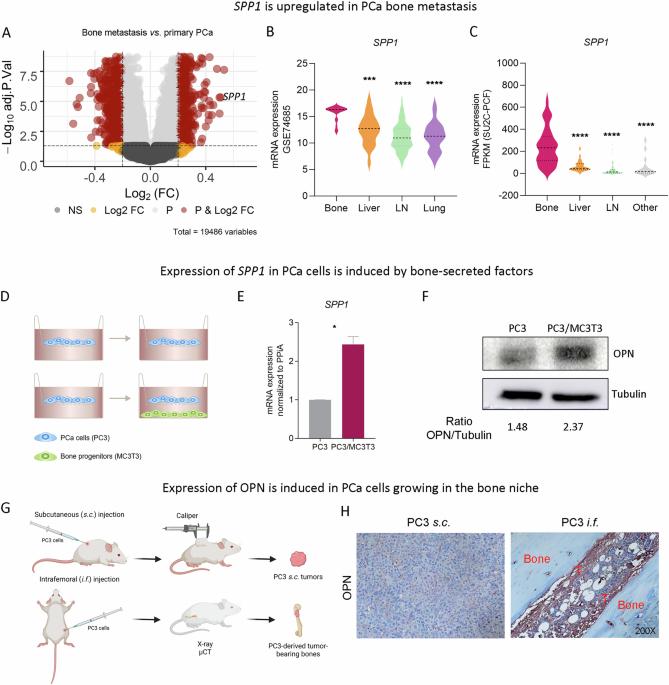pka驱动的SPP1激活作为连接骨微环境与前列腺癌进展的新机制。
IF 7.3
1区 医学
Q1 BIOCHEMISTRY & MOLECULAR BIOLOGY
引用次数: 0
摘要
由于治疗反应和患者预后的异质性,前列腺癌(PCa)骨转移(BM)提出了重大的临床挑战。在这项研究中,我们研究了蛋白激酶A (PKA)信号在调节骨桥蛋白(SPP1/OPN)表达中的作用,骨桥蛋白是一种与前列腺癌患者预后不良相关的蛋白质。通过整合多组学结果,我们确定了一种新的机制,其中骨源性i型胶原(Col1a1)和纤维连接蛋白(Fn1)通过激活PKA信号来刺激PCa细胞中SPP1的表达。这种骨诱导的SPP1调控在体外通过ca -bone共培养系统(PC3或C42B/MC3T3细胞系)和体内通过细胞系移植和患者来源的异种移植物(PDX)在皮下培养得到证实。重要的是,来自纵向患者样本的临床数据显示,使用enzalutamide(一种雄激素受体(AR)抑制剂)治疗可导致患者亚群中PKA信号传导和相应的SPP1表达增加,这突出了PKA/SPP1轴在AR靶向治疗下疾病进展中的相关性。总的来说,我们强调了骨微环境在影响前列腺癌进展中的关键作用,指出SPP1/OPN作为识别具有活性PKA信号的肿瘤的生物标志物,可以用于管理对ar定向治疗的耐药性。本文章由计算机程序翻译,如有差异,请以英文原文为准。

PKA-driven SPP1 activation as a novel mechanism connecting the bone microenvironment to prostate cancer progression
Prostate cancer (PCa) bone metastasis (BM) poses a significant clinical challenge due to the heterogeneity of treatment responses and patient outcomes. In this study, we examined the role of Protein Kinase A (PKA) signaling in modulating the expression of osteopontin (SPP1/OPN), a protein associated with poor prognosis, within a subset of PCa BM patients. By integrating multi-omics results we identified a novel mechanism in which bone-derived type-I collagen (Col1a1) and fibronectin (Fn1) stimulate SPP1 expression in PCa cells through the activation of PKA signaling. This bone-induced regulation of SPP1 was confirmed both in vitro, using PCa-bone co-culture systems (PC3 or C42B/MC3T3 cell lines), and in vivo, using cell lines’ engraftments and patient-derived xenografts (PDX) grown intrafemorally. Importantly, clinical data from longitudinal patient samples revealed that treatment with enzalutamide, an androgen receptor (AR) inhibitor, led to an increase in PKA signaling and corresponding SPP1 expression in a subpopulation of patients, highlighting the relevance of the PKA/SPP1 axis in disease progression under AR-targeted therapies. Overall, we underscored the critical role of the bone microenvironment in influencing PCa progression, pointing out to SPP1/OPN as a biomarker for identifying tumors with active PKA signaling, which could serve to manage resistance to AR-directed treatments.
求助全文
通过发布文献求助,成功后即可免费获取论文全文。
去求助
来源期刊

Oncogene
医学-生化与分子生物学
CiteScore
15.30
自引率
1.20%
发文量
404
审稿时长
1 months
期刊介绍:
Oncogene is dedicated to advancing our understanding of cancer processes through the publication of exceptional research. The journal seeks to disseminate work that challenges conventional theories and contributes to establishing new paradigms in the etio-pathogenesis, diagnosis, treatment, or prevention of cancers. Emphasis is placed on research shedding light on processes driving metastatic spread and providing crucial insights into cancer biology beyond existing knowledge.
Areas covered include the cellular and molecular biology of cancer, resistance to cancer therapies, and the development of improved approaches to enhance survival. Oncogene spans the spectrum of cancer biology, from fundamental and theoretical work to translational, applied, and clinical research, including early and late Phase clinical trials, particularly those with biologic and translational endpoints.
 求助内容:
求助内容: 应助结果提醒方式:
应助结果提醒方式:


